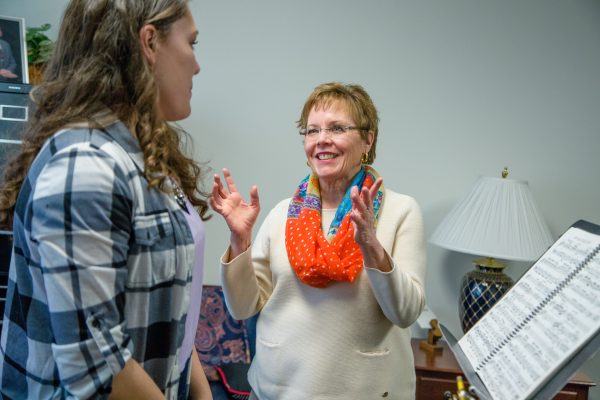At first, I can’t think of the right words. (Did I say “hot dog”? I meant “doughnut.”) Then the right side of my face goes numb and starts to droop. I feel nauseated, pressure building inside my skull. My right arm and leg turn into noodles and won’t hold me up. I begin to slur words and stutter. Not long after, pain hits—horrendous pain that feels like I have an axe lodged in my skull. Lights, sounds, smells—all make the pain and nausea worse. I’m so dizzy, the floor is rocking like a ship’s deck.
I was first diagnosed with my chronic illness (complicated migraines including hemiplegic migraine) in 2015. But it took six and a half years to reach that diagnosis.
Even as I tell my story, this is really the story of what God is doing through my illness. He is working in my life beyond what I can comprehend. As I live with my chronic illness, I shouldn’t grieve but grow.
My first attack occurred in August 2008, just two weeks before I was due back at BJU for my senior year. After a five-day stay in the hospital that included a grueling spectrum of tests and a nightmare of a migraine, I was sent home with no answers. The doctors assumed because they couldn’t find any physical reason for my symptoms, my problem must be psychological.
Six months later, I developed seizures and a severe stutter. Back at BJU part-time second semester, I had to learn how to navigate both school and my new disabilities. Providentially, I was taking a course called Introduction to Exceptional Learners that semester. Dr. Joe Sutton—and the class in general—was encouraging and helpful as I learned to understand my new normal. Because a migraine medication helped with my seizures and somewhat with my “floppy spells” (as my family called my hemiplegic migraine attacks), my neurologist tentatively diagnosed me with complicated migraines.
Seeking God’s promises
When life loomed dark with my family and me living with chronic illness, I didn’t cling to specific Scripture passages, per se. I clung—and still cling—to God’s promises. For example, in the middle of a seizure I remember God’s promise to always be with me. He will not give me more than I can handle without Him—even when I’ve spent a month moving no farther away from my bed than the living room. He has a purpose for my chronic illness: changing me into the image of Christ.
Often in my personal study of God’s Word, I read through Psalms searching for God’s promises and for His characteristics. Then I write them down to meditate on later when I need them.
Eventually, my seizures calmed, and the stutter almost completely went away. By God’s grace, I was able to return to BJU full-time the fall of 2009, and I graduated with a BS in English education in 2010. For five years, I had only minor recurrences of the mysterious floppy spells. I was teaching high school English and loving every minute.
Then, in 2015, another major attack struck. By God’s sovereignty, a few months before, an urgent care doctor I had seen for a bad cold referred me to a headache specialist, who was able to formally diagnose me with complicated migraines including hemiplegic migraine. She explained to me that complicated migraine basically means I have symptoms of several different types of migraines. One of those types is hemiplegic migraine—the rarest and most debilitating form.
Just knowing what I have brought great relief. Life becomes more bearable, even if it doesn’t change the symptoms. I know what to expect, what medicines to take for help.
Even though having a diagnosis may make life easier, knowing what is wrong doesn’t remove the illness. In September of 2016, I had another severe attack.
I had made it through the 2015–16 school year with very few hemiplegic attacks (what my family previously called floppy spells). So, it was discouraging to realize that even taking preventive medication and using abortive medications (medicine taken during a migraine to stop it) wouldn’t prevent severe attacks.
Because I was teaching in a small Christian school at the time, and because within two years I had two major hemiplegic attacks that would require months of recovery, I reluctantly resigned from my teaching position. That decision was the hardest decision I’ve ever made, and I still cry sometimes when I think about it.
Building a support group
But God had a plan for my resignation, just as He had a plan for bringing me to the doctor who gave me the referral to the headache specialist. When I resigned, I moved back in with my parents in Brevard, North Carolina. There, I gathered a group of friends who also are living with chronic illness. While we all have different illnesses, we have similar struggles. Because of this, we can encourage each other in our walk with God. For example, one of my good friends with Hashimoto’s disease (a thyroid condition) understands the uncontrollable mood swings I get just before a migraine because she gets uncontrollable mood swings on her bad days, too. We have encouraged each other with verses that speak God’s truth into our hearts so that we can still think right even when we don’t feel right.
This same friend recommended a functional neurologist here in Greenville—a vital part of my support group. Dr. Brian has been treating me since February 2017. Through his understanding of how my brain and my body communicate, he has been able to help me gain better control of my migraines. I am now off all but one of my preventive medications, though I still need my abortive medicines—and probably always will. But my body responds much better to the abortive medications because of the supplements Dr. Brian has recommended, the brain exercises he has me doing, and the restricted diet he has me following.
Being a good steward of my spoons
I—and anyone living with chronic illness—have a limited amount of energy each day. The chronically ill community measures energy in spoons. With 12 spoons, I can redecorate my living room (7 spoons), do laundry (3 spoons), and do the dishes (2 spoons). On a bad day, I may only have one spoon and will use it to take a shower before collapsing back in bed. If I use more spoons than I have that day, I cut into the next day’s spoons. And it’s not always a 1:1 ratio. If I use one of tomorrow’s spoons today, I could end up with two or three fewer spoons tomorrow.
Something I’ve had to learn while living with chronic illness is that it’s okay to rest. Resting is being a good steward of my spoons. If I try to do too much when I’m already running out of energy, I’m just going to make it worse, sometimes for days. Just as I am to be a good steward of my money so that I don’t go into debt, I need to be a good steward of my spoons.
Serving with chronic illness
Part of being a good steward of my spoons is finding ways to serve others that don’t use spoons. When I’m stuck in bed for weeks at a time, I can’t get up and watch a friend’s kids or spend time in person with my friends. But I can write on my personal blog. I can text my friends. I can email or write letters. There are many ways I can minister to others while living with chronic illness that don’t require much energy. But I had to be creative to find those.
I miss teaching, but God has taught me that His plan is good. I still get to do aspects of teaching English in my role with BJUtoday. And they’re the aspects I love. While I don’t get to grade papers (the actual assigning a grade part I hated anyway), I get to help faculty and staff improve their writing. While I’m not working with 40 or more teens, I do get to interact with college students, most closely with my two student workers—and I am teaching them how to write for a website!
So yes, living with chronic illness is hard. But God is writing a story through my life that I can’t even imagine. His plan for me is good—and purposeful. Now, I am working on a masters in biblical counseling so that I can help others with the comfort God has given me.








